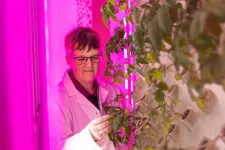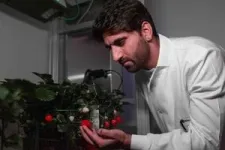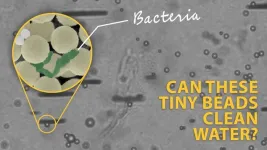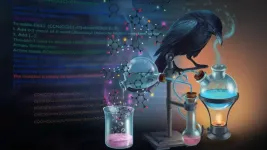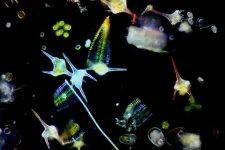(Press-News.org) A unique $3.7m plant lab will put researchers on the frontline in the fight against climate change and create crops for “tomorrow’s atmosphere today”.
The new flagship facility at the University of Essex will allow scientists to adapt plants for a hotter drier planet as food security is increasingly threatened.
It boasts a cutting-edge commercially standard vertical farm, an indoor field that replicates real environments anywhere in the globe, and suites that imitate a warming world – with researchers able to raise CO2 concentration and temperature levels at will.
Computer plant scanning technology will also be used to monitor plants as they grow – and pinpoint precise changes in photosynthesis.
The research will be underpinned by AI and robotics that will develop new ideas, technologies, and strategies to predict how agriculture and the natural world are changing.
With the human population expected to reach 9.7 billion by 2050, a step-change in agricultural productivity, sustainability and resilience is needed to keep up with food demand.
'Secure everyone's future'
World-leading biologist Professor Tracy Lawson is spearheading the project, which builds on her decades of pioneering work into plant productivity, improving photosynthetic process and boosting crop water use.
Professor Lawson said: “This amazing facility places plant research at Essex in a unique position to be able to grow and select plants for tomorrow’s atmosphere today.
“This cutting-edge lab will put us at the forefront of research into how we can help plants change and adapt to climate change – helping secure everyone’s future.
“This state-of-the-art facility will help the world cope with a growing population by ensuring future food security by developing climate resilient plants.”
The University will be the first in the UK to have a commercial standard vertical farm and is the only lab in the nation to combine all the facilities.
The Smart Technology Experimental Plant Suite (STEPS) facility will develop strategies to optimise plant performance whilst working towards net zero.
And will allow researchers to foster connections in the community and develop relationships in agriculture, horticulture, and technology businesses.
Pioneering
It builds on the work of the influential and pioneering Essex Plant Innovation Centre (EPIC).
EPIC brings farmers, technologists, and scientists together to improve the resilience of crops to drought, increase yields and secure the food chain during extreme weather scenarios.
Students will be at the forefront of the work helping develop and conduct experiments with the University’s internationally renowned researchers, as well as providing a unique undergraduate experience and training opportunity.
Young scientists will now be able to begin their careers in a cutting-edge facility unique to Essex.
The STEPS lab was part funded by the Wolfson Foundation who pledged $1.2million to support its development.
'Race against time'
Paul Ramsbottom, chief executive of the Wolfson Foundation, said: “We are in a race against time to futureproof agriculture against climate change, not just in the UK but globally.
“The University of Essex is leading the way in critical research and development to support innovation and sustainability in food production, and we are delighted to be funding the technology platforms that will help them achieve this.”
This project will include long-time industry collaborator Innovation Agritech Group (IAG).
The British company installed the commercial standard vertical farm unit, deploying a full scale GrowFrame360 – which is unique to UK universities.
Kate Brunswick, Business Development Director at IAG, said: “We are honoured to join forces with the University of Essex and the Wolfson Foundation in launching the first commercial vertical farm within a UK university.
“This milestone collaboration embodies our collective dedication to driving positive change in agriculture.
“Our innovative GrowFrame360 technology will empower scientists and students alike to tackle the complexities of a changing climate on future crop production, aiming for future food security.
“We eagerly anticipate the transformative impact this facility will have on agricultural resilience and productivity.”
END
New $3.7m climate crop lab will create food for ‘tomorrow’s atmosphere today’
2024-05-08
ELSE PRESS RELEASES FROM THIS DATE:
New air-breathing spacecraft to provide better Earth observation and quicker communications
2024-05-08
Scientists at the University of Surrey are developing a new way to power low-orbit spacecraft using – literally – thin air.
Surrey Space Centre aims to enable extremely low-altitude spacecraft orbits in the upper atmosphere, thanks to funding from the UK Space Agency.
This new spacecraft concept could offer new capabilities in Earth observation, climate monitoring and satellite communications.
Dr Andrea Lucca Fabris, principal investigator from Surrey Space Centre and an electric propulsion specialist, said:
“There are benefits to flying in very low altitude orbits, like being able to operate Earth observation at much ...
Exploring the asteroid apophis with small satellites
2024-05-08
The author of a disaster novel couldn't have dreamed it up any better: On a Friday, the thirteenth of all days, the potentially dangerous asteroid (99942) Apophis will come extremely close to humanity. On 13 April 2029, there will only be around 30,000 kilometres between the cosmic rock and Earth. It will then be possible to see Apophis with the naked eye as a point of light in the evening sky, even from Würzburg.
What makes the asteroid so dangerous: its average diameter is an impressive 340 metres. If it were to hit the Earth, the ...
Research warns of hazardous health risks from flavored vapes
2024-05-08
Research warns of hazardous health risks from flavoured vapes
Research predicts the potential formation of 127 acutely toxic chemicals in flavoured vapes
Findings underscore the urgent need for comprehensive regulation of vaping products
Wednesday, 8 May 2024: New research has uncovered the potentially harmful substances that are produced when e-liquids in vaping devices are heated for inhalation. The study, published in Scientific Reports, highlights the urgent need for public health policies concerning flavoured vapes.
The research team at RCSI University of Medicine and Health Sciences, Dublin, used artificial ...
FAU researchers receive $1M in FDOH grants to fight Alzheimer’s disease
2024-05-08
Three Florida Atlantic University researchers at the forefront of Alzheimer’s disease (AD) research have each received a $350,000 grant from the Florida Department of Health’s “Ed and Ethel Moore Alzheimer’s Disease Research Program.”
The Ed and Ethel Moore Alzheimer’s Disease Research Program was established to improve the health of Floridians by stimulating research into the prevention, diagnosis, treatment, care management and cure of AD.
Florida has the second highest incidence of AD in the nation with 580,000 people ages 65 and ...
Swarms of miniature robots clean up microplastics and microbes, simultaneously (video)
2024-05-08
When old food packaging, discarded children’s toys and other mismanaged plastic waste break down into microplastics, they become even harder to clean up from oceans and waterways. These tiny bits of plastic also attract bacteria, including those that cause disease. In a study in ACS Nano, researchers describe swarms of microscale robots (microrobots) that captured bits of plastic and bacteria from water. Afterward, the bots were decontaminated and reused. Watch a video of them swarming.
The size ...
Where wildlife is welcome
2024-05-08
How do city residents feel about animals in their immediate surroundings? A recent study by the Technical University of Munich (TUM), the University of Jena and the Vienna University of Technology shows how different the acceptance of various wild animals in urban areas is. Important factors are the places where the animals are found and their level of popularity - squirrels and ladybugs come out on top here. The results have important implications for urban planning and nature conservation.
The relationship between city inhabitants and urban animals is complex, ...
THC lingers in breastmilk with no clear peak point
2024-05-08
PULLMAN, Wash. – When breastfeeding mothers in a recent study used cannabis, its psychoactive component THC showed up in the milk they produced. The Washington State University-led research also found that, unlike alcohol, when THC was detected in milk there was no consistent time when its concentration peaked and started to decline.
Importantly, the researchers discovered that the amount of THC they detected in milk was low – they estimated that infants received an average of 0.07 mg of THC per day. For comparison, a common low-dose edible contains 2 mg of THC. The research team stressed that it is unknown whether this amount has any impact ...
An AI leap into chemical synthesis
2024-05-08
Chemistry, with its intricate processes and vast potential for innovation, has always been a challenge for automation. Traditional computational tools, despite their advanced capabilities, often remain underutilized due to their complexity and the specialized knowledge required to operate them.
Now, researchers with the group of Philippe Schwaller at EPFL, have developed ChemCrow, an AI that integrates 18 expertly designed tools, enabling it to navigate and perform tasks within chemical research with unprecedented efficiency. “You might wonder why a crow?” asks Schwaller. “Because ...
U of T researchers lead discovery of natural compounds that selectively kill parasites
2024-05-08
An international team led by researchers at the University of Toronto has found a family of natural compounds with potential as new and more effective treatments for parasitic worms. The compounds stall the unique metabolic process that worms use to survive in the human gut.
Parasitic worms transmitted through soil wreak havoc in developing countries in the tropics. Infection by these parasites leads to malaise, weakness, malnutrition and other debilitating symptoms, and can cause developmental defects in children and impair their growth.
“Soil-transmitted parasitic worms infect over one billion people around the world, typically in low-income communities of developing countries ...
Limited adaptability makes freshwater bacteria vulnerable to climate change
2024-05-08
Freshwater resources are limited, accounting for only 3.5% of Earth’s water, with just 0.25% accessible on the surface. Nevertheless, freshwater lakes are essential for ecosystem functioning and global carbon cycling due to their high biological productivity and microbial activity. They are critical to human survival, providing drinking water, supporting agriculture, fisheries, and recreation. However, climate change – particularly rising temperatures – threatens these habitats by disrupting microbial communities that are essential for nutrient cycling and water quality maintenance.
Challenging established evolutionary paradigms
“Considering ...
